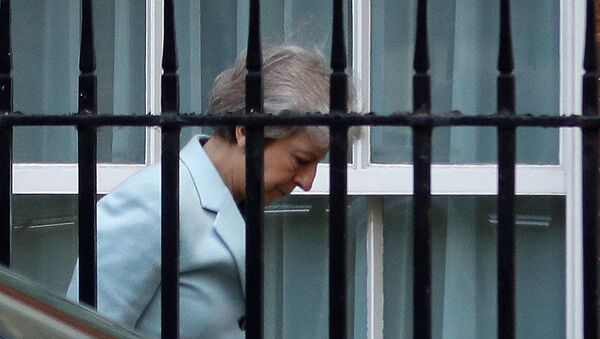British Prime Minister Theresa May visited an informal gathering of fellow EU27 leaders in the Austrian city of Salzburg this week to try and sell her Brexit vision to Brussels. Instead, the EU member states opted for a series of jibes at her so-called Chequers plan, finally taking the proposal in its current form off the table.
French President Emmanuel Macron said May's proposals for post-Brexit economic ties were "not acceptable" because they undermined the single market. He went on to brand the leading Brexiteers "liars" who "left the next day so they didn't have to manage it," apparently referring to former Foreign Secretary Boris Johnson and former Brexit Secretary David Davis, who resigned in July over the Chequers deal.
READ MORE: Negotiators Struggle to Make Progress as PM May Sticks by Chequers Brexit Plan
EU President Donald Tusk delivered another blow to May, stating in an unforgiving fashion that her post-Brexit trade plan simply "will not work." He said the EU wasn't ready to compromise on issues such as the single market and the Irish "backstop" question.
Germany's Angela Merkel joined the chorus, stressing that there is no place for compromises on the single market.
Belgian Prime Minister Charles Michel said that May's proposals were "not enough" to strike a deal, while Austrian Chancellor Kurz showed more remorse: he said he viewed Brexit "negatively," but added that negotiations were going "quite well."
Irish Prime Minister Leo Varadkar, for his part, voiced concerns that the sides are sliding towards a no-deal scenario amid Britain's looming departure from the bloc scheduled for March 2019. "Time is running out," he said. "We want to avoid a 'no deal Brexit,' but we are preparing for that."
Indeed, what seems like insurmountable differences at the Brexit negotiating table has fueled concerns that Britain might crash out of the bloc without an agreement, which would pose economic risks both to London and Brussels.
Varadkar's fears were echoed by his Dutch counterpart, Mark Rutte, who warned that his country had made "more preparations for a no deal."
READ MORE: EU Leaders 'Almost Unanimously' Support Second Brexit Referendum — Maltese PM
It also emerged earlier this month that Germany has begun preparations for a no-deal scenario. "The government is preparing for all possibilities related to [Britain's] exit," a spokeswoman for the Federal Ministry of Finance said. "This includes eventual legislative measures but also the hiring and training of additional staff, such in customs."
Following the apparent defeat of her Chequers deal in Salzburg, May said a new proposition for Ireland would come "shortly" and that London was working towards negotiating a full exit strategy for an October 18 summit.
May's Brexit plan contains two key sticking points: post-Brexit trade relations and the Irish border issue. The PM by all means wants to avoid a hard border between Northern Ireland and the Republic of Ireland, and between Northern Ireland and the rest of the UK. She has turned down the EU's "backstop" plan to keep Northern Ireland in the EU single market and set up a hard border in Ireland.
Another stumbling block is trade policy: under the Chequers proposal, London and Brussels would set up a free trade area, based on a "common rulebook" that will see both parties adopt the same standards on goods and which would spare the need for customs and regulatory border checks. At the same time, May wants London to have its own trade policy outside the customs union; but the EU has accused London of trying to cherry-pick European rules and rejected the idea amid concerns that it would disrupt the single market.





